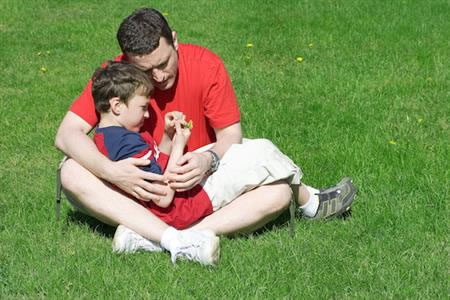
But most of the time when kids don't do the right thing, it's not because they don't know what the right thing is. It's because they choose something else.
In other words, they have another priority. So start with modeling, guidance, family habits of compassion and repair, as detailed in our last post.
Then, use these five strategies to help your child WANT to do the right thing, even when it's hard.
1. Stay connected.
When kids don't follow our lead and our rules, it's often because they feel disconnected. That means they don't feel like we're in their corner, so they have to look out for #1. In that case, why should they do what you want, if it means giving up what they want?
Why would our child feel disconnected from us, when we always love them? Because life is full and busy. Because when they're away from us, they orient around their teacher or their friends. Because despite our best efforts, we're human, which means we get distracted and impatient and disconnected ourselves.
When you're reunited with your child after a day apart, why not turn off your phone, forget about your list, and spend fifteen minutes just being fully present and loving with your child? Resist teaching or correcting; just appreciate your child.
Repeat daily. I predict that within a few days, your child will be "choosing" to cooperate with you much more. When children WANT to follow our lead, they're more likely to make choices in accordance with the values we've taught and modeled -- whether we're with them or not.
2. Make sure your limits are reasonable and age-appropriate.
If your limits feel too strict, kids look for work-arounds or give up on pleasing you, and strong-willed kids just become rebels. So help your child succeed in feeling like a good person who gets pleasure out of choosing to do the right thing, by setting limits that your child can follow successfully.
Train yourself to set your limits with empathy, which means you hold to your expectations, while offering understanding that your child doesn't like the limit. The limits teach kids what's right. The empathy makes the limits palatable so your child is more likely to accept them.
That means you'll be saying some version of this over and over all day long: "You wish you could..... I hear you. Right now, you can't. I know that feels hard. I understand. You can handle this. I'll help. Let's work together to make this work." That may sound like a lot of effort, but it's more motivating for your child than threats and will feel a lot better for you. And it won't take long for your child to stop fighting your limits and start looking for win-win solutions.
Giving up what they want in the moment, for something they want more (that warm relationship with you) is what helps children develop self discipline. That's a key skill when they need to make hard choices.
3. Give support.
Encourage your child so he knows he has the support to do hard things. If your child isn't meeting your expectations, ask yourself what support she needs. For instance, you want her to take her plate to the kitchen. You know it takes thirty days to create a new habit. So every single meal you connect warmly with her as you encourage, remind, and motivate her to take her plate to the kitchen. Notice that the connection has to be positive so the child wants to create the habit.
Over time, you gradually help your child create good habits that she "owns," for life. She begins to see herself as someone who takes her plate to the kitchen, who's responsible and considerate, who takes care of herself and her family.
4. Expect your child to "repair" relationships when he's done damage.
When kids' mistakes are met with compassion and encouragement instead of shame, they WANT to do better next time. Help him with his upset and anger first; then he'll be open to repair. Because it feels good to redeem ourselves, repair is empowering, as long as you're careful to make it an expectation but never a punishment. (That means he needs to decide what to do to initiate the repair.) Like cleaning up any other mess, the experience of repair makes us more careful about making messes to begin with.
5. Emotion-Coach.
When kids know what's right but won't do it, that's a red flag that they're in the grip of big emotions. The only way to "get rid" of emotions is to feel them, but the good news is that once you empathize with your child's upset and offer understanding, he'll "show" you those emotions and they'll begin to evaporate. He learns that emotions aren't an emergency, which helps him regulate them, so he can regulate his behavior -- and make better choices.
Pro Tip: When your child is having a hard time, empathize instead of teaching. That calms the drama. Later, your child will be ready to learn, and you can teach.
Isn't all this more work?
Yes. But this work on our part is how kids develop self-discipline and emotional regulation. Why would a child choose, over and over, to do the harder thing? Because on some level there's a bigger pay-off -- initially that warm relationship with the parent, and over time that clear sense of him or herself as a good person, who chooses to do the right thing.
That identity shapes their choices through life. It's the foundation of the inner compass. And it raises a child you'll be so proud to parent.





